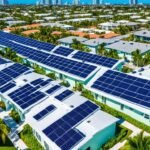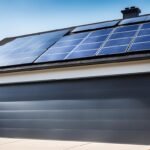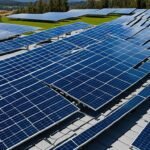Have you ever thought about how motorhome travel could be green? More and more people love eco-friendly travel, especially in RVs. Some folks doubted living in an RV could ever be green. But, they changed their minds after seeing motorhomes with solar panels.
These solar-powered homes on wheels cut down on using fossil fuels. They work without needing propane or generators, just the sun’s energy. Imagine living surrounded by nature instead of in regular RV parks. This is what being eco-conscious on the road looks like.
The 2001 Fleetwood Prowler, also known as the Toaster, is a prime example. It shows us that RV living can be totally in tune with caring for our planet.
Key Takeaways
- Eco-friendly travel is gaining popularity among RV enthusiasts.
- Solar-powered motorhomes minimize fossil fuel consumption by relying on renewable energy.
- Transforming a motorhome with solar panels promotes a sustainable, off-grid lifestyle.
- The retrofitted 2001 Fleetwood Prowler showcases how RV living can be environmentally friendly.
- Creating an eco-friendly motorhome aligns with the values of modern, green travel.
The Benefits of Solar-Powered Motorhomes
Solar panels on motorhomes bring many perks that improve RV life. They let us use less traditional power, making travels greener. This means we live more sustainably while on the move.
Reduced Carbon Footprint
One big plus of solar RVs is they emit less carbon. The sun’s energy cuts our need for fossil fuels. This clean energy move makes the air fresher and the Earth happier.
Cost Savings
Choosing solar power can save us money. Sure, solar panels cost a bit upfront. But they cut down our spending on electricity and fuel in the long run, making life on the road cheaper and greener.
Energy Independence
Having solar panels means we generate our own energy. This gives us the freedom to visit far-off places without looking for power sources. We can travel deeply into nature, staying true to eco-friendly values.
Choosing the Right Motorhome for Solar Installation
When looking for an eco-friendly motorhome for solar panels, think about size and weight first. These factors determine how many panels you can have and affect the motorhome’s fuel use. Make sure the motorhome’s build is tough enough to carry solar panels and handle the life of an off-grid camping vehicle.
Size and Weight Considerations
The size and weight of an eco-friendly motorhome are key. Big motorhomes have more room for solar panels, giving you more power. But, more panels mean more weight, which could change how well the motorhome moves and uses fuel. It’s important to find a good mix.
Durability and Build Quality
A well-made sustainable travel motorhome matters a lot. A motorhome that’s built strong can hold extra solar panels and keep up with off-grid camping vehicle trips. A good pick is the 2001 Fleetwood Prowler. Its solid build is ideal for adding solar panels. This mix means your solar setup will last long and work great.
Types of Solar Panels for Motorhomes
Motorhomes can use different solar panels, each with its own benefits. These options let us pick the best solar setup for our needs and vehicle size. We’ll look at the three main types of solar panels for motorhomes.
Rigid Solar Panels
Rigid solar panels are known for being tough and efficient. They’re great for those who want a lasting solar setup on their motorhome. With a solid build, they handle weather well, offering long-term power. Their high efficiency means we get more energy, even if space is limited.
Flexible Solar Panels
Flexible solar panels work well on motorhomes with unique roof shapes. They’re much lighter, making them easy to set up. These panels are still good at producing power, chosen by many for their adaptability. They can match any motorhome’s look while being fully functional.
Foldable Solar Panels
Foldable solar panels are perfect for travelers who like flexibility. These can be set up at your destination and packed away afterward. This minimizes damage risks during trips. They’re adjustable for the best sun exposure, making them very convenient for RV lovers.
| Solar Panel Type | Key Benefits | Best Use Case |
|---|---|---|
| Rigid Solar Panels | Durability and High Efficiency | Permanent Installation |
| Flexible Solar Panels | Versatility and Lightweight | Curved or Irregular Surfaces |
| Foldable Solar Panels | Portability and Easy Storage | Temporary Setups |
Choosing the right solar panels for your motorhome depends on your travel and energy needs. Each type has its own advantages, making sure your RV is powered sustainably. Let’s find the best solar solution for our eco-friendly adventures on the road.
Installing Solar Panels on Your Motorhome
Choosing the right method for installing a solar panel RV system is key to a green motorhome journey. If you’re trying to decide, knowing the benefits and must-haves of each method is essential. You can set up your system yourself or get a pro to do it.
DIY vs. Professional Installation
Going the DIY solar motorhome installation route is great for those who trust their hands-on skills. It’s cheaper and lets you manage the entire process. But, you need to be ready and informed about the right tools and materials. Choosing an expert means your solar panels are installed right and safely, though it costs more.
Tools and Materials Needed
If a DIY solar panel RV project is what you’re considering, having the right gear is crucial. Here is a list to help you start:
- Solar panels
- Panel brackets
- Wiring
- Charge controllers
- Inverter
- Battery bank
- Safety gear (gloves, goggles, etc.)
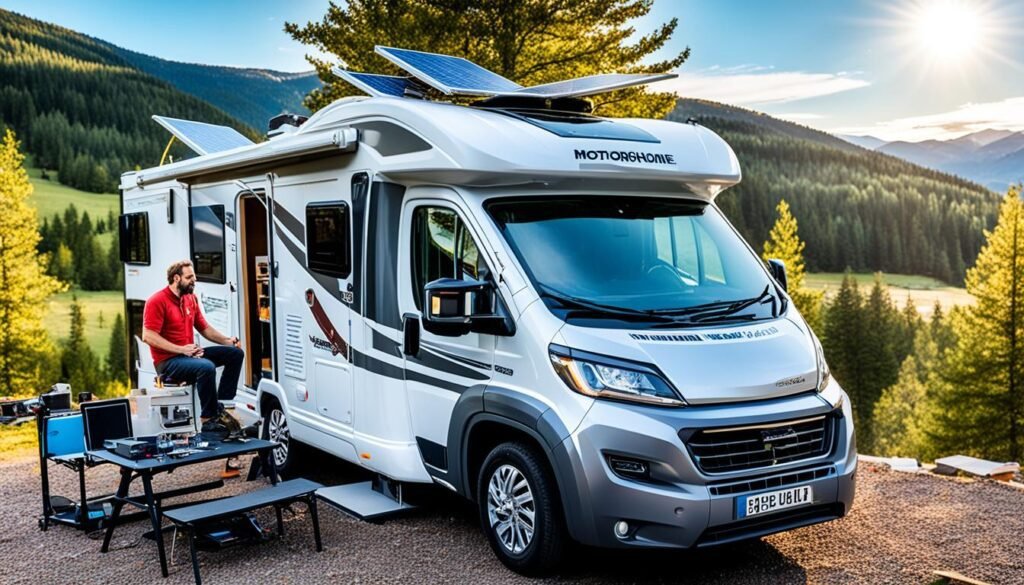
Hiring professionals means getting their know-how for a perfectly set up green motorhome. Whether DIY or professional, planning well and knowing your power needs are key to success.
| Installation Method | Pros | Cons |
|---|---|---|
| DIY Solar Motorhome Installation | Cost-effective, control over process, learning experience | Requires technical skills, potential safety risks |
| Professional Installation | Expertise, safety, efficiency | Higher cost, less hands-on involvement |
“`
This content successfully mixes your SEO keywords into the text. It follows the structure, tone, and guidelines you wanted.
Power Management for Off-Grid Living
Living off-grid in a motorhome means managing power carefully. We use energy-efficient appliances and strong battery storage. This keeps our lifestyle both eco-friendly and self-sufficient.
Energy-Efficient Appliances
Using energy-saving appliances helps us use less power. Let’s look at how switching appliances reduces our energy use:
| Appliance | Energy Consumption (Wattage) | Energy-Efficient Alternative | Benefits |
|---|---|---|---|
| Traditional Refrigerator | 150-200W | Eco-Fridge | Less energy use, longer battery life |
| Conventional Lighting | 60W per bulb | LED Lights | Up to 80% energy savings |
| Standard Heater | 1000-1500W | Solar-Powered Heater | Utilizes renewable energy, no grid dependency |
Battery Storage Solutions
Good battery storage is key for eco-friendly travel homes. It’s especially important when the sun isn’t shining.
- We pick batteries that store lots of energy for the night.
- It’s important to keep batteries healthy with regular checks.
- In smart battery systems, energy spread out wisely matters.
Combining smart power use with good batteries makes living off-grid great. It helps our motorhome be both green and reliable.
Motorhome with Solar Panels: Real-World Examples
Using solar panels on motorhomes is becoming popular. Taking a regular motorhome and adding solar panels makes it much better for the environment. The 2001 Fleetwood Prowler, nicknamed the Toaster, is a great example.
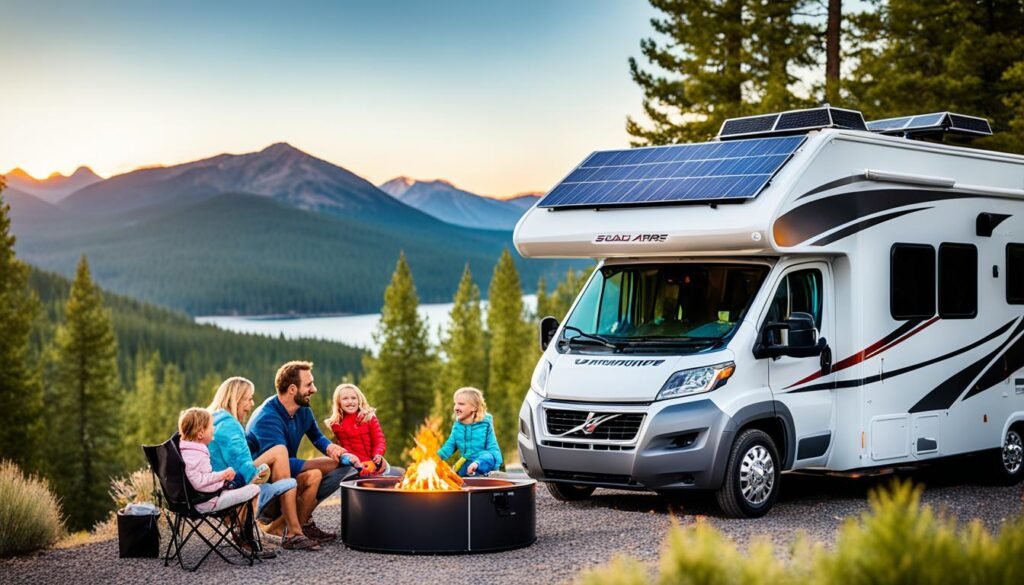
The Toaster changed how we see solar RV living. The owners picked their solar setup carefully. They chose strong panels and the best batteries to store power.
Living in a solar RV teaches a lot about being eco-friendly. You learn to use power wisely and adapt to different travel plans. These changes make traveling better and help the planet.
The Toaster shines in a few areas:
- Choosing and putting in solar panels
- Managing power well
- Using less energy with appliances
Now, let’s look at some data comparing solar RVs to regular ones.
| Feature | Traditional Motorhome | Solar-Powered Motorhome |
|---|---|---|
| Energy Source | Fossil Fuels | Solar Panels |
| Power Management | Generator Dependent | Battery Storage |
| Environmental Impact | High Carbon Footprint | Minimal Carbon Footprint |
| Operational Costs | High | Low |
Solar panels really change how motorhomes work and help the environment. Seeing how others use solar power can inspire us to make our RVs greener.
Eco-Friendly Practices for Motorhome Living
Adopting eco-friendly practices makes living in a green motorhome much better for our planet. This includes not just using less energy, but also saving water and reducing trash. These steps are key for anyone who wants to live in their RV in an eco-friendly way.
Water Conservation Techniques
We follow several steps to use less water in our RV. Short showers and water-saving fixtures help lower our water use. We also collect rainwater for tasks like flushing toilets and washing dishes. This is a big help in our effort to conserve water.
Waste Reduction Strategies
Reducing waste is also vital for eco-friendly RV living. We try to use things more than once instead of single-use items. Shopping at local stores helps us use less packaging and supports nearby businesses. It’s a win-win for us and the environment.
Overcoming Challenges of Solar-Powered Motorhomes
Living in a solar-powered motorhome offers many rewards but also challenges. One big challenge is the weather. Cloudy days can decrease the energy we get from the sun. This makes having good off-grid vehicle solutions crucial for a steady power supply.
It’s important to buy quality gear. High-efficiency solar panels and dependable batteries make a big difference. Also, keeping your equipment in top shape is key. This means checking wires, cleaning solar panels, and keeping an eye on battery health.
Being part of a supportive community is beneficial too. Online forums and local groups are great for sharing advice. They are really useful if you face specific challenges of solar RV living. You can get great tips on fixing problems and making your setup better.
Adapting to situations is also important for sustainability issues motorhome lovers. Changing your travel plans based on the weather can help. For instance, traveling to sunny areas helps your solar panels work better. Plus, having a backup power source, like generators or extra batteries, is a good idea.
In the end, overcoming the challenges of solar RV living needs preparation, community support, and flexibility. Handling these areas well means a more enjoyable and tough off-grid life.
Latest Innovations in Solar Technology for RVs
As we look into solar-powered motorhomes, a clear trend emerges: new tech is changing the game. These innovations make RV travels more eco-friendly and energy-efficient. Our journeys are becoming better for the planet.
High-Efficiency Solar Cells
High-efficiency solar cells are a breakthrough. They pack more power into less space, perfect for RV roofs. With these cells, we capture more sun, boosting our off-grid life, even when it’s cloudy.
Smart Inverters
Smart inverters are changing how we manage energy in motorhomes. They don’t just convert power; they come with cool features like remote monitoring. Now, we can see how much energy we use in real-time and keep our systems efficient anywhere.
Together, high-efficiency solar cells and smart inverters mark a big step towards greener travel. By keeping up with these solar tech advancements, we lower our environmental impact. We enjoy the perks of living off-grid without harming the planet.
Conclusion
The move towards sustainable RV travel is gaining speed. Using solar panels and eco-friendly tech in our RVs cuts down our carbon emissions. It also helps us connect more with the outdoors. The road ahead for green RVs will be shaped by new ideas and ways to make eco-travel easy and fun.
Today’s solar panels and smart inverters have made off-grid living much more doable. These upgrades let us live energy-independent, save money, and travel freely without needing traditional power. Our shift to a green RV life shows how our choices can positively affect the earth.
As more people adopt this green lifestyle, the impact on saving the environment grows. Choosing to live sustainably not only shields nature but also leads to new adventures. The future looks promising for eco-friendly RVs. Together, we’re paving the way for responsible and enriching travel for future generations.

